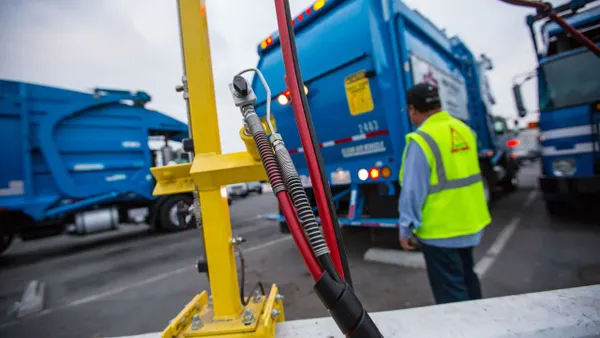Dive Brief:
- Mark King, an environmental specialist with the Maine Department of Environmental Protection, said during a webinar hosted by the National Recycling Coalition and the Pennsylvania Recycling Markets Center that, when he was in the U.S. Virgin Islands (USVI) responding to Hurricanes Maria and Irma, he found a "multi-pronged approach" worked best for managing organic debris.
- King said the federal government wanted to use air-curtain incineration to quickly remove debris, but there was significant concern over what would happen to the island's air quality. Instead, they were able to grind debris to pieces no larger than two inches. Debris was then composted to revegetate eroded areas, used as fill material in "silt socks" to control erosion or used as an alternative daily cover.
- The organic material was also used to build berms around and on top of landfill covers to protect nearby mangrove trees and shore up eroded landfill slopes, King said.
Dive Insight:
The USVI had to deal with hundreds of thousands of tons of organic debris because the islands were battered in back-to-back hurricanes during September 2017. Hurricanes Maria and Irma hit with rapid succession, creating an influx of debris before the original material could be collected and processed.
On St. Croix, King said, "Just as far as the eye could see, there were just giant piles" of organic and green debris. Most piles he said, though, were not clean — green waste would be piled up with construction debris and other waste, complicating the mission.
"It was very frustrating to have all that good, rich organic material, but have it contaminated with other materials." King said. "That made it a real challenge for composting. Nobody wants to have compost that’s full of all kinds of construction debris."
That challenge, however, is what presented so many different opportunities for King and others working to clear waste on the islands. Because not all the material was used for compost, some was available to shore up the Bovoni Landfill (which had eroded from rain damage) to protect mangrove trees — which themselves can help protect against erosion and flooding.
Debris management is an important part of planning for a disaster. It's also an important segment that the waste industry can play a direct role in, so it's crucial for local governments and companies to draw up response plans — and have multiple options.









